MEET “SCEPTICS”, “NEUTRALS” AND “BELIEVERS”: AN ALTERNATIVE APPROACH TO ANALYSING RESIDENTS’ ATTITUDES TOWARDS TOURISM IN URBAN DESTINATIONS
MEET “SCEPTICS”, “NEUTRALS” AND “BELIEVERS”: AN ALTERNATIVE APPROACH TO ANALYSING RESIDENTS’ ATTITUDES TOWARDS TOURISM IN URBAN DESTINATIONS
Author(s): Jelena ĐURKIN BADURINA, Daniela Soldić FrletaSubject(s): Tourism
Published by: Academia de Studii Economice - Centrul de Cercetare in Administratie si Servicii Publice (CCASP)
Keywords: tourism impacts; urban destinations; overtourism; local residents; social exchange theory;
Summary/Abstract: Methodological and theoretical advances are necessary to better understand the complex and heterogeneous nature of residents' perceptions and attitudes towards tourism in cities. This study provides a novel approach, challenging some of the postulates of the Social Exchange Theory. The study was conducted in the capital city of Croatia, Zagreb, and residents’ attitudes were gathered through self-administered questionnaire. The level of agreement with the statement that ‘tourism generates more benefits than costs for residents’ was used as a criterion for segmenting respondents into three groups: sceptics, neutrals and believers. Analysis revealed that the three groups did not significantly differ in perception of most of the negative impacts, but do differ when it comes to positive impacts. Results indicate that in cases where a urban destination is not (yet) exposed to overtourism, perceived positive tourism impacts play a more important role than the negative tourism impacts, as potential key opinion-changers in terms of future support for tourism development. Importance of this study lies in transforming the ordinary approach to residents’ perceptions and providing alternative framework for research, with more emphasis on relations between perceptions of positive and negative tourism impact, rather than factors affecting those perceptions. Policy implications include the need for city planners to foster residents’ participation in tourism planning and development, strengthen information campaigns on tourism impacts, and more regularly monitor resident perceptions of the effects of tourism development on their well-being
Journal: Theoretical and Empirical Researches in Urban Management
- Issue Year: 17/2022
- Issue No: 1
- Page Range: 24-44
- Page Count: 21
- Language: English

